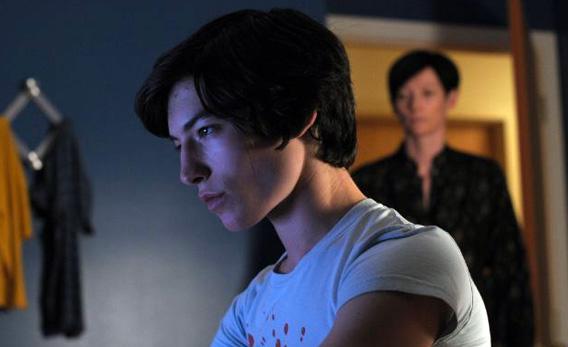Source material doesn’t get much grimmer than Lionel Shriver’s 2003 novel We Need To Talk About Kevin, in which the mother of a boy who has gone on a killing spree at school reflects on her son’s pre-massacre life as a miserable budding sociopath. So it makes sense that the film adaptation would be directed by Lynne Ramsay, a Scottish filmmaker whose two previous features, Ratcatcher and Morvern Callar, were both finely detailed explorations of the infinite varieties of human misery.
Shriver’s book (which is intoxicatingly, and sometimes toxically, readable) follows the thoughts of Eva Khatchadourian, a middle-aged travel writer turned half-unwilling parent, as expressed in long letters to her husband in the aftermath of the killings. It’s an entirely epistolary novel, and discursive as all get-out; we get not just Eva’s thoughts but her thoughts about her thoughts, her writerly self-consciousness about how she’s analyzing her own awful history (and Eva is nothing if not analytical). Ramsay’s approach is entirely different: She chucks the whole sheaf of letters into the fireplace, turning Eva’s story into an impressionistic, often dialogue-free narrative that’s woven from multiple strands of past and present, memory and dream.
That sounds great on paper, and for patches of the film, Ramsay’s scrapbook-left-out-in-the-rain approach makes for moments of great power and beauty. It’s not the fragmentation of the narrative that’s the problem with We Need To Talk About Kevin; it’s the content of some of those fragments, especially those involving the grief-addled mother in the present day. The movie Eva (played by Tilda Swinton) doesn’t hang out in cafés writing laceratingly honest, acidly funny letters—she’s not up to it, to put it mildly. Her nights are spent in a drugged and wine-sloshed haze, staring at the bare linoleum in her lonely, underfurnished house. During the day she rouses herself just enough to get to her job at a small travel agency, where her coworkers treat her as a pariah. (Or is it just that Eva believes she’s a pariah, and thus never approaches anyone?) The grinding sadness and squalor of her daily life are sharply evoked, but this frame story, with its emphasis on the numbed-out Eva as town scapegoat, makes its point a little too often.
When Eva’s not grimly sandblasting the red paint her hateful neighbors keep hurling at her porch (“Why doesn’t she just paint over it?” inquired my practical viewing companion), she slips into reveries about the past: her at-first happy marriage to Franklin (a heartbreakingly sweet John C. Reilly), her unhappy pregnancy with Kevin (played by Rock Duer as a baby, Jasper Newell as a young boy, and Ezra Miller as a teenager), and the 16 years she spent trying to bond with a child who seemed to have been born hating her.
It’s in these brief, painful vignettes of stunted parental and filial love that the movie comes alive. The three boys who play Kevin show a remarkable continuity, not just in their physical appearance but in their furious, dead-eyed gaze; Miller, in particular, bravely pushes his characterization well past the point of loathsomeness. There’s something off-putting and reptilian about this child from toddlerhood on, a quality Ramsay emphasizes by filming many scenes between mother and son—including a violent standoff over a dirty diaper—as if for a horror movie.
Ramsay excels at creating individual images that are startling and evocative: a slow zoom toward a sheer curtain billowing ominously in a window; a child’s finger in tight close-up, crushing brightly colored cereal into rainbow dust. As the momentum builds toward Eva’s recollection of Kevin’s heinous act (of which we learn only the basic contours at the beginning of the film), these repeated dreamlike images take on a sickening intensity. But their rhythm is constantly being undercut by the present-day scenes, which, in their insistent focus on the barren misery of Eva’s post-shooting life, come perilously close to wallowing in her abjection.
Even in the film’s weaker stretches, the fierce presence of Tilda Swinton made it impossible to tear my eyes away. I know there are those who find her too operatic, too actressy (I’ve taken them on in these pages) and it’s true that she’s not the sort to modestly disappear into her roles. But Swinton has star power in the astronomical sense—a distinctive, unearthly intensity that’s all her own. (Actually, there’s one other performer I can think of who shares this untarnishable, fairy-like quality: Björk.) Her unearthliness serves Swinton particularly well in this role, since the brittle, sardonic Eva is the opposite of an earth mother. Even when her son is a colicky infant, she can’t entirely suppress her resentment about the globetrotting life she’s given up for him, cooing at one point through gritted teeth, “Mommy used to be happy! Now Mommy wakes up every day and wishes she were in France!”
But whatever Eva’s maternal shortcomings, We Need To Talk About Kevin isn’t a cautionary tale about the failure of nurture; it’s a bleak meditation on the inexorable power of nature. Kevin kills, this mercilessly sad film suggests, because he is bad, and some people are bad because … well, the unanswerability of this question is the abyss this imperfect but powerful movie spends two hours gazing queasily into.
